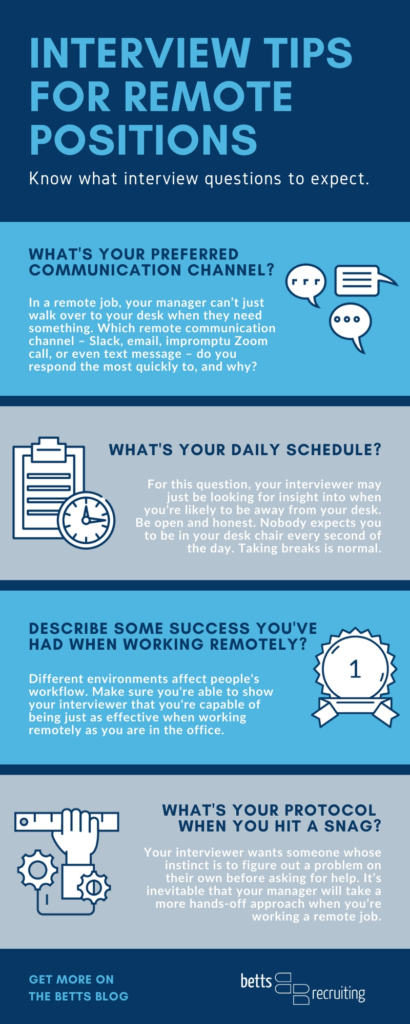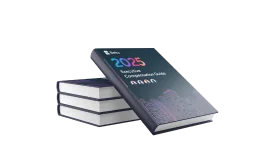Have you ever found yourself wishing your company had a more flexible work from home policy? Well, be careful what you wish for, because you might have a lot of working from home in your future. The current public health situation has caused companies everywhere to embrace the benefits of working from home and make remote work their new standard – at least for the time being – both for existing employees and new hires.
That means that next time you have an interview for a new role, you might not just be conducting the interview remotely. The role itself might be a fully remote position. And this might be uncharted territory in your career.
Get more tips for crushing your next job interview in our Interview Handbook.
There are things to think about when doing a remote interview for a remote job that you might not have considered if you’ve never done it before. Here are some things to consider before you start interviewing for remote positions. These should help you make sure you’re prepared.
Know what interview questions to expect
You’ve probably heard the classic interview questions – “What are your weaknesses?”, “Where do you see yourself in five years?” – a million times. But the interview questions you get for a remote role may be a lot different. Here are a few questions your interviewer might ask to see whether you can maximize the benefits of working from home.
“What’s your preferred communication channel?“
In a remote job, your manager can’t just walk over to your desk when they need something. But they still need prompt answers. Make sure you’re able to tell them which remote communication channel – Slack, email, impromptu Zoom call, or even text message – is the best way to reach you. Which of these do you respond the most quickly to, and why? And this part is key: Once you’re on the job, stick to your answer! If you chose Slack, your manager will likely prioritize Slack when pinging you. Be ready to respond to a Slack message in no more than three minutes.
“What’s your daily schedule?“
For this question, there’s not necessarily just one correct answer. Your interviewer may just be looking for insight into when you’re likely to be away from your desk. Be open and honest in your answer. Nobody expects you to be in your desk chair every second of the day. Taking breaks is normal. Obviously, copping to a two-hour video game break after lunch every day isn’t a good look. But you do have some flexibility in your answer here.
Be open and honest in your answer. Nobody expects you to be in your desk chair every second of the day. Taking breaks is normal.
“What’s your protocol when you hit a snag?“
Your interviewer will likely be looking for someone whose instinct is to figure out a problem on their own before asking for help. It’s practically inevitable that your manager will take a more hands-off approach when you’re working a remote job. This means they won’t necessarily be available right away to help you out with something. In any case, it’s always a little less convenient to communicate over Slack or the phone than in person. These remote communication channels should be reserved for when it’s necessary.
Use your interview to show off your remote work skills
Think about it this way: If your interview is remote, and the position is remote, then your interview is almost more of an audition than anything else. You’re showing what it will be like to work with you once the job starts. You’re not just taking advantage of a company’s work from home policy – you’re showing your own work from home policy as well. Here are some things to consider:
Expect the unexpected. Technology isn’t always reliable.
What if there’s a lag in your Zoom connection? What if the sound cuts out? What if, for whatever reason, you need to leave the call and dial back in? Know your backup communication methods – text, email, Zoom’s chat feature – and don’t get flustered. We’ve all been there. Your interviewer has almost certainly had technical difficulties before. It won’t be a dealbreaker. Handle it, and when you clear it up, rejoin the conversation smiling, not sweating.
Your interviewer has almost certainly had technical difficulties before. It won’t be a dealbreaker. Handle it, and when you clear it up, rejoin the conversation smiling, not sweating.
Present yourself well, and control your environment.
Dress the part. Keep the space clean. Know exactly how much of the room the camera will pick up…and then clean the entire room anyway. Before the interview starts, make sure the lighting in the room looks good on a screen, not in person. And make sure you’re in the quietest part of your house. If you have family or roommates who will be home, don’t hesitate to ask them to keep it down while you’re interviewing.
The benefits of working from home are many – if you know how to do it right. Now more than ever, companies are embracing those benefits. Adapting your interview skills to a remote-work environment is key if you hope to succeed in a changing work landscape.

